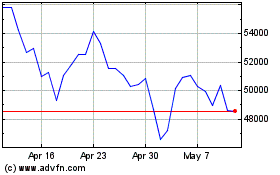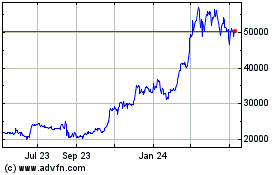Updated UK Cryptocurrency Tax Guidelines
December 20 2018 - 1:36PM
ADVFN Crypto NewsWire

Bitcoin Global News (BGN)
December 20, 2018 -- ADVFN Crypto NewsWire -- The tax agency
of the United Kingdom has released a more detailed report on how to
properly report cryptocurrency related taxes for individuals. They
paper acknowledges the gray areas, and the rapidly changing
industry, along with culture that surrounds it. Overall there is
optimism and a clear acceptance for the new financial tool, but
caution is taken and explain to ensure that over time the
integration can happen smoothly.
The Majesty’s Revenue and Customs
(HMRC) is responsible for collecting taxes and overseeing related
activities in the UK. They define cryptocurrencies as: Cryptoassets
(or ‘cryptocurrency’ as they are also known) are cryptographically
secured digital representations of value or contractual rights that
can be:
-
transferred
-
stored
-
traded electronically
They state three broad categories
that most cryptocurrency can fit into, as exchange tokens utility
tokens or security tokens.
-
Exchange tokens are intended to be
used as a method of payment and encompasses ‘cryptocurrencies’ like
bitcoin. They utilise DLT and typically there is no person, group
or asset underpinning these, instead the value exists based on its
use as a means of exchange or investment. Unlike utility or
security tokens, they do not provide any rights or access to goods
or services.
-
Utility tokens provide the holder
with access to particular goods or services on a platform usually
using DLT. A business or group of businesses will normally issue
the tokens and commit to accepting the tokens as payment for the
particular goods or services in question.
-
Security tokens may provide the
holder with particular interests in a business, for example in the
nature of debt due by the business or a share of profits in the
business.
Although any of these can be
transferred as payment for goods in exactly the same way that fiat
currency is, they explicitly do not consider cryptocurrencies money
for the purpose of the tac guidelines. This has strong implications
for business, but these updates are made specifically for guiding
individual cryptocurrency holders.
Where individuals are paid in
cryptocurrency, it is to be recorded as a non-cash payment and
taxed accordingly. The other primary situation where taxes apply
are from mining, airdrops or capital gains. Increases in value of
any token is to be treated like that of shares, securities and
other financial products. However, mining poses some of the biggest
questions for taxes moving forward. Ultimately the process could be
completely undertaken by machines, and the deposits can be
transferred to anonymous wallets, or ones not associated with a
single individual.
By: BGN Editorial Staff
Bitcoin (COIN:BTCGBP)
Historical Stock Chart
From Jun 2024 to Jul 2024

Bitcoin (COIN:BTCGBP)
Historical Stock Chart
From Jul 2023 to Jul 2024

Real-Time news about Bitcoin (Cryptocurrency): 0 recent articles
More Bitcoin News Articles